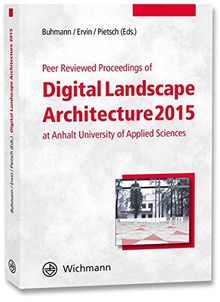
Landscape architecture necessarily bridges scales - from global to local - and engages with multi-disciplines - engineering, economics, fine arts, et al. Today, landscape architecture practice, education, and research are necessarily predominantly digital, while "eye-hand" skills - seeing, sketching, pruning, e.g., - and human-scale remain central to the discipline. In 2015, as "computing everywhere" becomes a reality, from new email-ready watches to self-driving cars; as "the cloud" becomes ever more pervasive, and ever fuller; and as global problems of security of all sorts, and threats to quality-of-life continue to mount; it is all the more necessary to turn to design, and its emphasis on synthesis, and well-functioning built and natural systems, to make sense of, and increasingly, alter the destiny of planet Earth.
Developments in the emergent practice of geodesign, combining the power of data-driven simulations and evaluations with the full spectrum of digital communications and media, continues to transform the education of landscape architects, and will influence professional practice and public discourse over the coming decades. Participatory planning and design reach ever-new heights with crowd-sourced data collection, open-source software and innovation, and social networks for information sharing. New international standards, cooperation, and conflicts, as well as concerns about climate change, and macro-ecological transformations in its wake, make the discipline of landscape architecture ever-more complex, and essential.
The International Digital Landscape Architecture (DLA) Conference on Information Technologies in Landscape Architecture, held in June 4-6, 2015 at the Anhalt University of Applied Sciences campus in Dessau, Germany, serves as a bellwether of the changing concerns of landscape architecture.
Contributions to these proceedings come from leading landscape architectural firms as well as the research labs of university programs in Landscape Architecture and Environmental Planning. The focus of the Digital Landscape Architecture 2015 proceedings is organized into the following areas:
. Landscapes Visualization and Augmented Reality
. Digitally Facilitated Systems Thinking
. Systems Thinking in Landscape Design Processes
. Geodesign Simulation Models for Real-Time Assessments
. Geodesign Concepts and Case Studies
. Teaching with Geodesign Tools and Approaches
This conference series is organized by Professor Erich Buhmann of Anhalt University of Applied Sciences. An international and interdisciplinary scientific conference program committee further defines the profile and concept of the Digital Landscape Architecture Conference DLA series. An even larger board of reviewers guarantees the scientific value of lectures and written contributions to the proceedings through the blind peer-reviewed process. The conference serves as a platform for the ECLAS Committee Digital Technology and experts in this field.